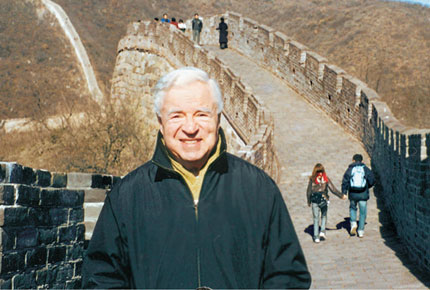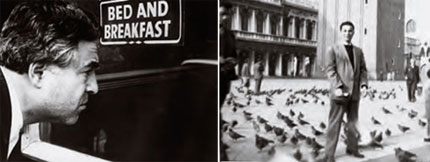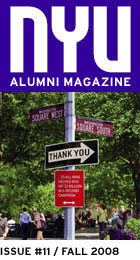alumni q&a
The Travel Guru
Arthur Frommer / WSC ’50
by Renée Alfuso / CAS ’06
Arthur Frommer, founder of the world–famous travel guides, never intended to review cafés in Barcelona or hostels in Istanbul—until the army intervened. Drafted during the Korean War, Frommer had a linguistic gift for Russian and French that saved him from serving as an infantryman in Korea; instead he was stationed in Germany with U.S. Intelligence. Reveling in this first trip abroad, Frommer used every bit of free time to explore Europe but was surprised that the men in his unit never left the barracks because they didn’t know how to get around in a foreign land. So Frommer spent his final weeks in the army writing a small book called The G.I.’s Guide to Traveling in Europe. It did so well that, upon his return to New York, he reworked it for civilians, landing his first best–seller in 1957 with Europe on 5 Dollars a Day.
 Arthur Frommer stands atop the Great Wall of China on a recent trip
Arthur Frommer stands atop the Great Wall of China on a recent trip
The book’s success prompted Frommer to leave a budding law career and helped build a publishing empire that produces 340 titles each year—a quarter of all travel guidebooks sold in the United States. Now 79, he somehow finds time to write a syndicated column, host a weekly radio show, and update his blog several times a day. And he still travels whenever he can—but on a budget, of course.
Why do you advocate traveling on a budget?
It leads you to the more authentic aspects of destinations and you experience the real life of the people, rather than the artificial world created by deluxe hotels. This upscale world is really a faceless phenomenon because a deluxe hotel is the same in Cairo as it is in Moscow as it is in Bangkok. The cliché that “you get what you pay for” has been thrown at me all my life and it is not true. You cannot assume that price is a reliable indicator of quality, and I will go to my grave claiming the less you spend, the more you enjoy.
What’s the most common mistake travelers make?
They overpack, which sounds simplistic, but people bring so much clothing that they become beasts of burden and prisoners of porters and taxicabs. I saw this [last spring] on a river cruise in Europe, these people showing up with giant suitcases, which limited their freedom. Another mistake is that people tend to go places during peak periods. You can no longer go into the Sistine Chapel in July and August, or into the Uffizi galleries in Florence, without feeling like a sardine.
How can travelers avoid that?
It’s important to be a pioneer. Many people don’t take chances and therefore all they see are the standard sights that are already familiar from picture books. The best way to visit any city is to simply strike out on your own two feet seeking adventure, go into the neighborhoods and experience the life that people are leading there.
Where should everyone visit before they die?
They should go on an African safari to see the world as it was before human beings settled it. When you go to the Masai Mara of Kenya, there are no roads, no power lines, and it is a mystical experience. Another is to go to the pyramids and the Sphinx in Egypt because it’s important to see a civilization that predates even the Greeks and gives a sense of the sweep of human history.
 Frommer takes a closer
look at London in 1969 to update his original best–selling guide; visiting Venice’s St. Mark’s Square in his early years of travel while in the U.S. Army.
Frommer takes a closer
look at London in 1969 to update his original best–selling guide; visiting Venice’s St. Mark’s Square in his early years of travel while in the U.S. Army.
What are some of your favorite places to visit in the United States?
I like the national parks foremost. Yellowstone, especially, is almost life changing. Another of my favorite spots is Sanibel Island, off the west coast of Florida. It has one of the great nature preserves in the United States, called the J.N. “Ding” Darling National Wildlife Refuge.
Do you recommend using discount travel Web sites, such as Orbitz, Travelocity, and Expedia?
Well, serious questions have been raised about the impartiality of airfare search engines. So I now turn to a new group of Web sites called aggregators, such as Kayak.com and SideStep.com. What’s so wonderful is that you just use them to find out what’s there and then buy your tickets directly from the airline and don’t pay the additional fee.
If you could pick, where would you have been born?
I love France; I’m a Francophile. I enjoy going back to Paris and could go there endlessly. France is on the frontier of every subject that effects the enjoyment of your stay—cuisine, music, art, fashion. It’s quite a country.What is the one thing that you never travel without?
A book, for when the flight is delayed or you can’t get into the hotel. Instead of storming and shouting, I catch up on important reading that otherwise I might miss.
photos courtesy of arthur frommer







